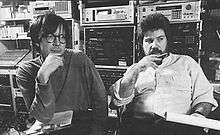Ric Burns
Ric Burns (born 1955) is an American documentary filmmaker and writer. He has written, directed and produced historical documentaries since the 1990s, beginning with his collaboration on the celebrated PBS series The Civil War (1990), which he produced with his older brother Ken Burns and wrote with Geoffrey Ward.
Ric Burns | |
|---|---|
 Ric Burns (left) with Brian Keane (1995) | |
| Born | 1955 (age 64–65) Baltimore, Maryland |
| Nationality | American |
| Occupation | Filmmaker, writer |
Biography
Born in Baltimore, Maryland, Burns moved to Ann Arbor, Michigan at an early age, and attended Columbia University and Cambridge University, breaking from his graduate work to join his brother on the production of the Civil War series. Since founding Steeplechase Films in 1989, he has directed several programs for WGBH Boston's American Experience, including Coney Island (1991). He also wrote and directed The Donner Party (1992).
In 1995, Burns wrote, directed, and co-produced The Way West. In April 2002, Burns completed Ansel Adams, a co-production of Steeplechase Films and Sierra Club Productions for American Experience. Since 2018, Burns has served as a trustee of the National Humanities Center in Research Triangle Park, NC.
New York: A Documentary Film
Burns is probably best known for his series New York: A Documentary Film, which premiered nationally on PBS. The eight-part, seventeen-and-a-half-hour film chronicles the city’s rise from a tiny Dutch trading post through its continuing preeminence as an economic and cultural capital of the world.
The first five episodes of New York were broadcast in November 1999; the sixth and seventh episodes in the fall of 2001; and the eighth episode in September 2003. There will be a ninth episode, chronicling New York since the events of September 11, 2001.[1]
More recent films
Recently completed projects include The Chinese Exclusion Act (2018), a deeply American story – about immigration and national identity, civil rights and human justice; about how we define who can be an American, and what being an American means – the film examines the economic, cultural, social, legal, racial and political dimensions of the law; the forces and events that gave rise to it; and the effect it has had, and continues to have, on American culture and identity.
Oliver Sacks: His Own Life (2019) explores the riveting and profoundly moving life and work of this unique figure — an old-fashioned polymath and natural historian of the 19th century sort - who redefined our 21st century understanding of brain and mind. The film is based in part on footage shot in the months before he died – including more than eighty hours with Sacks himself, his partner, Billy Hayes, and some of his closest friends, colleagues and family members – as he grappled with the meaning of his life, with life itself, and his impending death with a spellbinding candor, power and humanity.
Selected filmography
- Coney Island (1991)
- The Donner Party (1992) on the Donner Party
- The Way West (1995)
- New York: A Documentary Film (1999; expanded 2003)
- Ansel Adams: A Documentary Film (2002)
- Columbia: A Celebration (2003)
- Eugene O'Neill: A Documentary Film (2006)
- Andy Warhol: A Documentary Film (2006)
- We Shall Remain (2009), on Native Americans
- Into the Deep: America, Whaling & the World (2010)
- Nantucket (2011)
- Death and the Civil War (2012)
- Enquiring Minds: The Untold Story of the Man Behind the National Enquirer (2014)
- American Ballet Theatre: A History (2015)
- Debt of Honor: Disabled Veterans in American History (2015)
- The Pilgrims (2015)
- VA: The Human Cost of War (2017)
- The Chinese Exclusion Act (2018)
- Oliver Sacks: His Own Life (2019)
Bibliography
- The companion book to the Civil War series (with Geoffrey C. Ward and Ken Burns)
- New York: An Illustrated History (with James Sanders and Lisa Ades)
Selected list of awards and nominations
- 31st News & Documentary Emmy Awards (2010) - Outstanding Nonfiction Series (nominated) [2] for Into the Deep: America, Whaling & The World
- 27th News & Documentary Emmy Awards (2006) - Outstanding Writing for Nonfiction Programming (won) [3] for Andy Warhol: A Documentary Film
- 27th News & Documentary Emmy Awards (2006) - Outstanding Nonfiction Series (nominated) [3] for Andy Warhol: A Documentary Film under the American Masters series.
- 27th News & Documentary Emmy Awards (2006) - Outstanding Individual Achievement in a Craft: Writing (won) [3] for Eugene O'Neill
- Peabody Award (2006) - (won) [4] for Andy Warhol: A Documentary Film
References
- "New York: Episode 9 (Coming Soon)". Retrieved 8 March 2018.
- "Nominees for the 31st Annual News & Documentary Emmy Awards" Archived 2011-07-26 at the Wayback Machine. Retrieved 9 March 2011.
- "Nominees for the 27th Annual News & Documentary Emmy Awards" Archived 2007-06-15 at the Wayback Machine. Retrieved 9 March 2011.
- "GEORGE FOSTER PEABODY AWARD WINNERS" Archived July 26, 2011, at the Wayback Machine. Retrieved 9 March 2011.